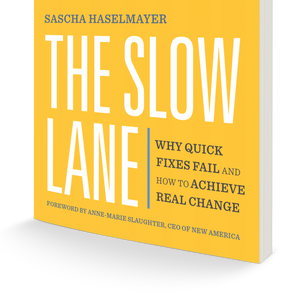Armida Fernandez comes into focus on Zoom. Currito jumps on my lap to peek into the camera, even before we get to say 'hi'. Not the way I imagined this. And so, we talk about the charms of Currito in particular and of rescue dogs in general. Then, I want to know: How did Armida end up playing such a pivotal role in improving public health and safety in Mumbai's slum areas?
This is a Slow Lane story, and it starts in the late 1970s, when Armida was a young pediatrician and lecturer at the Municipal Sion Hospital in Mumbai. At the time, she analyzed the hospital’s post-natal mortality rate, revealing that babies were dying in unusually high numbers. Armida was shocked by her findings. But what shocked her even more was what happened when she presented her findings at a medical conference: she was ridiculed. People didn't want to believe her, and the truth she uncovered. But her supervisor, she recalls, told her, “Well, if that is the truth, and if it feels bad, do something”.
Making A Dent.
Sion Hospital, at the time, was understaffed and under-resourced. Doctors and nurses had four times as many patients than they could handle. But Armida wouldn't let go of the data and began to track down each of the causes of the high mortality rate among newborns. In one case, she found that incubators, donated by UNICEF, proved too hard to clean. Instead of saving lives, they became hotbeds for infections. She removed them and developed an effective work-around: she fine-tuned normal heaters and used desk lamps to provide the warmth for premature babies. It did the trick, and made a first dent in mortality rates.
In her pursuit to lower mortality, she became the first doctor to specialize in premature babies or newborns with high-risk or complex health conditions in India. A neonatologist. She continued, in her very systematic way, to identify causes of disease and death. And tackled them one by one. She banned problematic milk powder and formula from the ward that caused diarrhea. And instituted breastfeeding instead, and went on to build Asia’s first breast milk bank. To overcome shortages, she trained new mothers to become wet nurses providing milk for their own, and the ward’s other children.
Her approach to fixing things kept delivering results: Mortality rates kept dropping, and the neonatal department grew under Armida’s leadership, including an intensive care unit. By the late 80s, it was considered world-class, saving thousands of lives. The team was proud of the results.
Follow The Problem. Solve it. Repeat.
While the hospital department delivered quality, Armida discovered yet another disturbing truth: children still kept dying. Not in the hospital, but at home in their communities. Parents, the most of whom lived in slum areas, were unable to look after children with complicated care requirements. This finding shook Armida and her team because it undermined the great improvements in the hospital had made to save children’s lives. Babies left the hospital in good health, only to fall into illness through dangerous conditions at home.
Providing care in communities, where assistance was needed, was officially outside Armida's remit as a hospital doctor. She decided to follow the evidence anyhow, and go where the families were. So, she began to take hospital staff to the slums. Whilst they had experience treating slum residents at the hospital, experiencing their actual lives provided many new insights. It also hardened their resolve to do something. In 1999, she and her team founded Society for Nutrition, Education and Health Action (SNEHA), an NGO.
SNEHA soon expanded their mission beyond child mortality, to also reduce violence against children and women. Armida and her team couldn't ignore the evidence of violence against children and women they saw at the hospital. In fact, the situation was so prevalent that a whole ward had been dedicated to just the treatment of female burn victims.
Let Others Be Solvers.
From the outset, Armida's team at the hospital, including students, visited the slum every week. These visits did more than inspire research, they revealed the dignity and humanity of children and families living under the most severe circumstances. They were surprised to learn that many children were happy, and families would invite the team into their homes. On the ground, they found that health workers at health posts in the slums were deeply embedded in the community, but lacked specialist skills. And received little in the way of recognition by other healthcare professionals.
SNEHA began to change the dynamics, developing the skills of health post workers and became the first to show first real appreciation for their work. Armida's team also provided training to families themselves, helping them navigate their health needs and access resources. All interventions used the same clinical approach Armida had used to lower child mortality at the hospital. Research to validate new truths, and randomized control trials to discover what works. These were simply the best practices in medical research, but SNEHA took them into the lives of communities, but made them more human by engaging families and frontline workers in finding the best answers.
Armida soon realized that she didn’t have the skills to run a growing organization like SNEHA in a way that would achieve the best results. She found a talented manager, Vanessa D’Souza, to succeed her as CEO. Vanessa professionalized Armida's approach to problem-solving and grew SNEHA to 500 employees. Over time, Armida's evidence-based approach evolved into what is called a continuum of care approach, making sure that women and children have continuous access and awareness of health services they need to live healthy and safe lives. SNEHA today serves tens of thousands of vulnerable families, women, and children. Cities across India replicate their solutions, like the referral system for women in high-risk pregnancies, that alone has saved tens of thousands of babies.
Government Officials? They, Too, Will Solve.
As Armida and I look back on her story, we talk about the role of the government. For decades, SNEHA has been in what Armida calls a highly productive partnership with the municipal government of Mumbai. Armida attributes this success to a high degree of trust. First in her as a person, who delivered results (she started out in a government hospital, after all). Later, that trust was extended to SNEHA, which, she said, “we started with partnership baked into its DNA”.
Building fruitful partnerships is what let Armida take her problem-solving approach from within the small, controlled world of a hospital ward, to a slum population of five million. Her work became a constant laboratory for the city. A rigorous focus on evidence helped surface truths and get everyone to agree on a common mission. SNEHA was a support infrastructure for anyone looking to solve these problems, instead of prescribing solutions. That is how officials in government, as well as social or health post workers, could take the lead. Evidence did the work of providing feedback. With time, SNEHA developed a unique reputation: where other NGOs stood out through activism, complaints and critique, SNEHA focused on celebrating improvements. In almost 25 years, SNEHA has never publicly criticized their partners in government.
Purpose, Data, Trust.
Can you spot the Slow Lane at work in this extraordinary story? I found three lessons to take away, that are instructive, not just about public health.
The first is about purpose. Armida intuited, from the outset, that she was only succeeding at her job if children were safe and alive. By reframing her purpose in this way, she ran against all kinds of systems and traditions: She looked at the established medical technology, the incubators, and found that they were fancy, but ineffective. She looked at her qualification, and found she had to reframe her job as neonatology, to organize the right care. She looked at what happened once children returned home, and reorganized to support better community health and social work. Her clinical approach to problem-solving kept revealing more profound issues, including the scandalous levels of violence against women and children. For her, the burn unit for women represented no more than a Band-Aid over an urgent problem to be solved.
The second lesson is about data. Data, for Armida, is a tool to establish truths for anyone serious about making progress. SNEHA today uses countless ways and tools to collect data, much like Rosanne Haggerty used quality data first to provide supported housing, then to solve homelessness in cities across the United States, and to let black families take charge of improving public services in Brownsville. And the story shows us how data can best be put to use, as an enabler for human relationships: by sharing the agency, and trusting others to do the right thing.
The third is about trust. Armida had the wisdom to hold her urgency as she realized that others could become problem-solvers, just like her. Despite the urgency, and her exceptional skills, she didn't choose the path of being a hero, who takes charge to impose her way. Data for her was not a tool to enforce her ideas, but let all parties unleash the creativity of communities to find out what works. She trusted that others are capable problem-solvers just like her, guided by results.
This story draws on research and conversations I had with Armida Fernandez in 2021 for the development of Cities and Social Entrepreneurs: A Playbook for Catalytic Collaboration, and was made possible by the support of Manmeet Mehta of Ashoka, David Lubell of Welcoming International, and Catalyst 2030.



